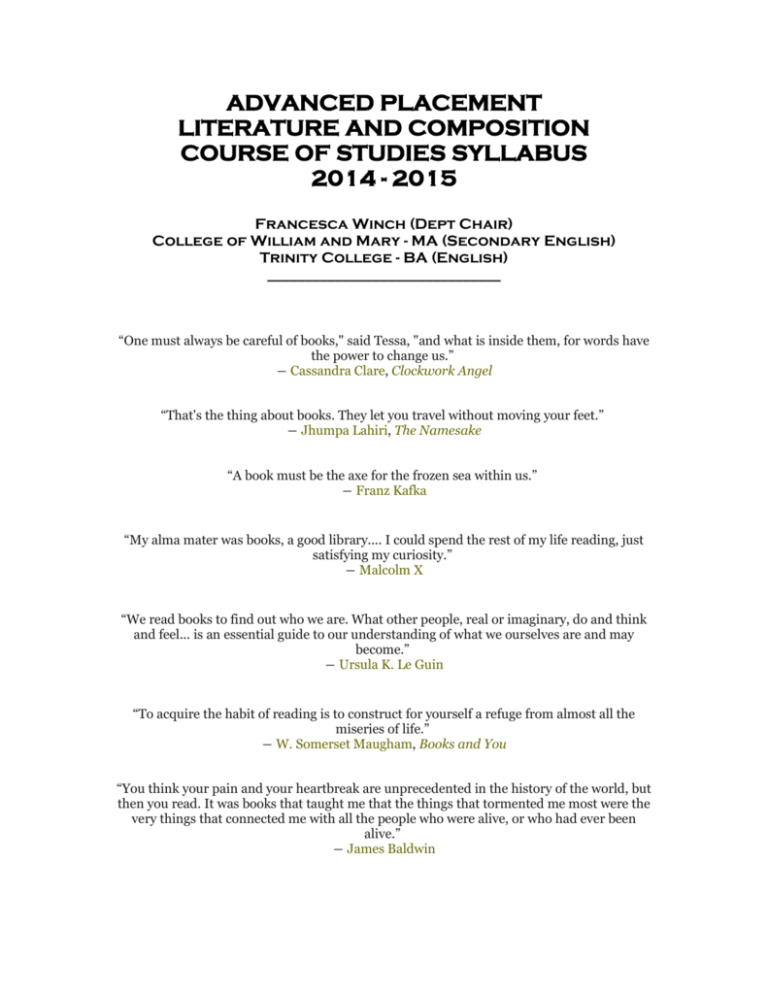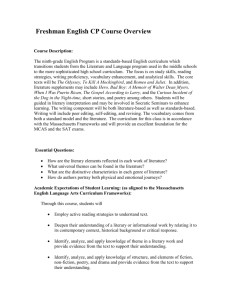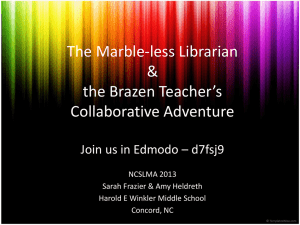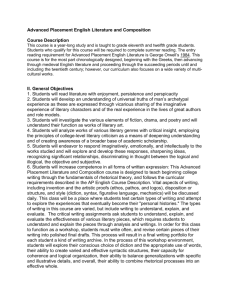
ADVANCED PLACEMENT
LITERATURE AND COMPOSITION
COURSE OF STUDIES SYLLABUS
2014 - 2015
Francesca Winch (Dept Chair)
College of William and Mary - MA (Secondary English)
Trinity College - BA (English)
_______________________________
“One must always be careful of books," said Tessa, "and what is inside them, for words have
the power to change us.”
― Cassandra Clare, Clockwork Angel
“That's the thing about books. They let you travel without moving your feet.”
― Jhumpa Lahiri, The Namesake
“A book must be the axe for the frozen sea within us.”
― Franz Kafka
“My alma mater was books, a good library.... I could spend the rest of my life reading, just
satisfying my curiosity.”
― Malcolm X
“We read books to find out who we are. What other people, real or imaginary, do and think
and feel... is an essential guide to our understanding of what we ourselves are and may
become.”
― Ursula K. Le Guin
“To acquire the habit of reading is to construct for yourself a refuge from almost all the
miseries of life.”
― W. Somerset Maugham, Books and You
“You think your pain and your heartbreak are unprecedented in the history of the world, but
then you read. It was books that taught me that the things that tormented me most were the
very things that connected me with all the people who were alive, or who had ever been
alive.”
― James Baldwin
Contact Information: Please don’t hesitate to contact me with any questions or concerns
throughout the year. Being proactive makes all the difference in life. If something confuses you,
let me know ASAP so we can work it through together. The best way to reach me is at my school
email address: Francesca.winch@apsva.us. You may also contact me through the English Office:
(703) 228-5368. The English Dept secretary’s name is Ms McKaye. She can take your message.
Course Overview
This course will be taught at the level of a college class. It demands a knowledge of literature
(which can only come through extensive reading) and a willingness to work hard to master
analysis and composition skills. Your grade will be determined by your demonstrated abilities in
reading, writing, and discussion. The reading load is intensive, and the level of thinking required
is high; your grades will obviously reflect your commitment and motivation to do the required
work. Commitment and motivation are the key factors to success. Try NOT to focus on whether
you LIKE a text. Instead, read to LEARN something about the human condition.
Course Objectives
Students will focus on close reading skills
Students will develop annotation skills
Students will develop an analytical understanding of the elements of fiction: plot, characters,
theme, setting, point of view, and literary devices.
Students will pay attention to the nuances of the language, stylistic diction, syntax, tone, and
audience.
Students will read for a sense of meaning/understanding.
Students will pay attention to details by discerning patterns and/or relationships in a text and
by making connections.
Students will analyze selections of fiction, poetry and drama that result in a sophisticated
understanding of the work as a whole.
Students will perfect their writing skills using the writing process through prewriting,
drafting, editing and revising.
Students are expected to use the MLA (Modern Language Assoc.) format for documentation.
Students will develop and refine the individual writer’s voice
Students will be active, not passive learners.
Writing Requirements
Students will use the writing process-- planning, drafting, editing and revising
Timed (40 minute) in-class essays generated from Advanced Placement Questions
Annotation of texts
Formal out-of-class essays/Research paper
Practice of Advanced Placement Exam questions (APQs and multiple choice)
Cooperative group work with written preparation/presentation
The Exam
The Literature and Composition exam is a three-hour skills-based test. There is no prescribed
content area that will be tested; rather, students must demonstrate their ability to read and
comprehend both poetry and prose passages and to write three essays of literary analysis. The
exam breaks down as follows:
One hour of multiple-choice questions (52-56 in total) measuring reading comprehension for
poetry and prose representing various time periods and styles of writing
Two hours to produce three essays -- one analyzing a poem or poems, one analyzing a prose
passage, and one free-response question that provides a prompt to which the student must
respond using a work of his or her own choice (a novel or a play)
Grading
Letter Grade
A
B+
B
C+
C
D+
D
E
APS GRADING SCALE
Percentages
Quality Points
90, 91, 92, 93, 94, 95, 96, 97, 98, 99, 100
87, 88, 89
80, 81, 82, 83, 84, 85, 86
77, 78, 79
70, 71, 72, 73, 74, 75, 76
67, 68, 69
60, 61, 62, 63, 64, 65, 66
0-59
4.0
3.5
3.0
2.5
2.0
1.5
1.0
0.0
AP & IB
Quality Points
5.0
4.5
4.0
3.5
3.0
2.5
2.0
0.0
Student grades reflect student achievement and not student behavior.
Quarterly grades will round up when the percentage is .5 or higher.
In addition to achievement, work habits as noted in the report card comments will be
evaluated for each course using the following symbols:
+
Surpasses Expectations
#
Meets Expectations
^
Approaching Expectations
N
Needs Improvement
The final grade is required to be calculated using the quality points and not percentages,
letter grades, number or point systems.
The following formula will be used to calculate quarter grades:
Tests/ Quizzes 25%
Writing/Essays/APQs/Projects 25%
Presentations 20%
Homework 15%
Classwork 15%
Student Materials
Literature: Whenever possible, I encourage you to have your own copy of major works so that
you can highlight and annotate as you read. You will find it much easier to incorporate this work
into your writing and come to understanding if you are able to “mark” the text. If you do not
have your own copies of works, you will need an ample supply of post-it notes.
Notebook: Please have a separate 2-inch binder for this class. You will need to organize for the
following categories: class notes, handouts, glossary, literary criticism, compositions.
Other: a composition book for journal entries, highlighters, post-it notes in various colors, pens
and pencils, loose leaf notebook paper.
Attendance
We will be covering a great deal of material in this course every single day. Attendance is always
important, but it is especially important in an Advanced Placement course. What is covered in
class cannot be “made up” from the perspective of class participation and discussion, along with
cooperative group work. As a matter of personal integrity and responsibility, I expect you to be
in class. Be advised that an unexcused absence will result in a zero for that day’s work,
regardless of which category it falls into or how much weight it carries.
Plagiarism
If a student is caught plagiarizing or permitting another student to plagiarize his/her work, he/she
will receive a zero and may not rewrite the assignment. If there is a second offense, the student
will be referred to the assistant principal so that appropriate action may be taken.
Written Work
You will be writing numerous (3 or more per quarter) analytical papers about fiction, drama and
poetry, as well as Advanced Placement Questions (APQs). Our aim will be to refine and polish
your writing with a focus on controlling tone, establishing and maintaining voice, and achieving
appropriate emphasis through diction and sentence structure.
It is expected that as a senior in an Advanced Placement class, errors in mechanics, grammar, and
punctuation should be minimal. All written work (other than timed APQs) must be wordprocessed, using size 12 font, Times New Roman, double-spaced. Should textual support be
required, please use MLA format. (Guidelines for this are provided at www.mla.org.)
All written work, including homework, papers and projects, must be submitted at the beginning
of the class period. Late papers, regardless of reason (including computer failure) will be
penalized 10% each day, even if they are only one period late. IF YOU ARE IN SCHOOL ON
ANY GIVEN DAY, BUT MISS THIS CLASS, YOU ARE REQUIRED TO LEAVE YOUR
HOMEWORK IN MY BOX IN THE MAIN OFFICE or it will be considered late. I do check
attendance.
Student Responsibilities and Writing Assignments
1. Students will focus on critical reading, writing and thinking skills needed to be successful on
the Advanced Placement English Literature and Composition Exam.
2. Students are required to memorize and be familiar with the “Bedford Terms” (a compilation
of terms for elements of fiction, poetry and drama. These terms can be found in Perrine’s
Literature: Structure, Sound and Sense.
3. Short Stories:
A. Students are required to fill out a “Story Analysis Chart” for each selection
read. These charts will aid students in the development of analytical
writing.
B. Students will write analytical essays on selected stories, focusing on specific
elements of fiction. The essay is developed through the writing process:
notes, outline, rough draft, edit and final copy.
4. Major Literary Works:
A. Students are required to take notes on a “Major Works Data Sheet” for each
selection read.
B. For each major literary work there will be a timed writing assignment. Some
will also require out-of-class writing assignments.
5. Poetry Response Portfolio
Students will read a wide range of poetry throughout the year and will be asked to
respond to specific poems.
Textbooks, Novels and Plays
Arp, Thomas R., and Greg Johnson, Perrine’s Literature: Structure, Sound and Sense. 9th
Ed. Boston: Thomson/Wadsworth, 2006.
Barnet, Sylvan, Morton Berman and William Burto. Eight Great Comedies. New York,
New York: New American Library, 1958.
Bronte, Emily. Wuthering Heights. New York, New York: Bantam Books, 1974.
Gaines, Ernest. A Lesson Before Dying. New York, New York: Vintage, 1997.
Kesey, Ken. One Flew Over the Cuckoo’s Nest. New York, New York: Penguin, 2003.
Martel, Yann. Life of Pi. Orlando, Florida: Harcourt, Inc., 2001.
Morrison, Toni. Song of Solomon. New York: Knopf, 1977.
Roberts, Edgar V. Writing About Literature. Upper Saddle River, New Jersey: Pearson
Prentice Hall, 2006.
Shakespeare, William. Richard III OR Hamlet. New York, New York: Washington Square
Press, 1992.
Trimble, John R. Writing With Style: Conversations on the Art of Writing. 2nd Ed. Upper Saddle
River, New Jersey: Pearson Prentice Hall, 2000.
Williams, Tennessee. Streetcar Named Desire. New York, New York: New American
Library, 1947
Overview of Planned Readings
1st Quarter
Major Literary Works
Antigone by Sophocles
Jane Eyre by Charlotte Bronte
Short Fiction (Perrine’s Literature: Structure, Sound and Sense)
Plot/Structure: “Reading the Story” p. 61-67
“Plot and Structure” p. 103-111
“Hunters in the Snow” by Tobias Wolff -- p. 86
Character:
“Characterization” p. 161-166
“Everyday Use” by Alice Walker-- p. 166
Theme: “Theme” p. 188-194
“The Lesson” by Toni Cade Bambara-- p. 195
POV:
“Point of View” p. 227-233
“The Lottery” by Shirley Jackson -- p. 251
Symbolism:
“Symbol, Allegory and Fantasy” p. 274-285
“Where Are You Going, Where Have You Been” by Joyce Carol OatesP. 311
Irony:
“Irony” p. 332-338
“The Kugelmass Episode” by Woody Allen -- p. 348
Poetry - (Perrine’s Literature: Structure, Sound and Sense)
“What is Poetry?” p. 647-654
“The Last Night She Lived” - Emily Dickinson - p. 657
“Reading the Poem” p. 668-677
“Mirror” - Sylvia Plath - p. 680
“Denotation and Connotation” p. 686-692
“Desert Places” - Robert Frost - p. 696
“A Hymn to God the Father” - John Donne - p. 697
“One Art”- Elizabeth Bishop - p. 698
“Imagery - p. 700-703
“I Felt A Funeral, in my Brain” - Emily Dickinson- p. 705
“Those Winter Sundays” - Robert Hayden - p. 709
Writing About Literature
Chapter 1 “The Process of Reading, Responding To, and Writing About
Literature” p. 1-52
Chapter 3: “Writing About Character: The People in Literature” p. 64-76
Chapter 4 “Writing About Point of View: The Position or Stance of the
Work’s Narrator or Speaker” - p. 77-92
Writing the College Essay
2nd Quarter
Major Literary Works
Song of Solomon, Toni Morrison
Streetcar Named Desire, Tennessee Williams
Independent Book Research Project/Paper
Poetry (Perrine’s Literature: Structure, Sound and Sense)
“Figurative Language: Simile, Metaphor, Personification, Apostrophe,
Metonymy” p. 714-724
“Metaphors” - Sylvia Plath - p. 726
“To His Coy Mistress” - Andrew Marvell- p. 730
“Figurative language 2: Symbol. Allegory” p. 734-745
“The Road Not Taken”- Robert Frost- p. 734
“Because I Could Not Stop For Death” - p. 752
Writing About Literature
Chapter 5 - “Writing About Plot and Structure: The Development and
Organization of Narratives and Drama”
Chapter 6- Writing About Setting: The background of Place, Objects and
Culture in Literature”
Chapter 7- “Writing About an Idea or Theme: The Meanings and the Messages
In Literature”
3rd Quarter
Major Literary Works
Hamlet by William Shakespeare
The Kite Runner by Khled Hosseini
Poetry (Perrine’s Literature: Structure, Sound and Sense)
“Figurative Language 3: Paradox, Overstatement, Understatement, Irony- p. 756
“Ozymandias” - Percy Bysshe Shelley, p. 764
“A Considerable Speck” - Robert Frost -p. 770
Allusion- p. 778
“Out, Out--” - Robert Frost - 779
Tone - p. 804-808
“My mistress’ eyes” - William Shakespeare - p. 809
“The Flea” - John Donne - p. 814
Musical Devices - p. 822- 829
“God’s Grandeur” - Gerard Manley Hopkins- p. 828
“Traveling Through the Dark” - William Stafford -- 835
Rhythm and Meter” p. 838-852
“Had I the Choice” - Walt Whitman - p. 854
“The Aim Was Song” - Robert Frost - p. 855
4th Quarter
Major Literary Works
Siddhartha by Herman Hesse
(Legacy Project)
Poetry (Perrine’s Literature: Structure, Sound and Sense)
Sound and Meaning p. 864-875
“I Heard a Fly buzz-- when I died” - Emily Dickinson- p. 871
“Landcrab” -- Margaret Atwood - p. 877
Pattern - p. 883-891
“Do Not Go Gentle Into That Good Night” - Dylan Thomas -p. 889
“Acquainted With the Night” - Robert frost - p. 897
Writing About Literature
Chapter 18 - “Writing and Documenting the Research Essay” Using Extra
Resources for Understanding”
Below I have provided information from the College Board for both students and parents to read.
The last page asks for the signatures of student and parent indicating that they understand and
agree to the content as well as the expectations for this Advanced Placement English Literature
and Composition course.
A WORD FROM THE COLLGE BOARD:
The Advanced Placement Course:
An AP English course in Literature and Composition engages students in the careful
reading and critical analysis of imaginative literature. Through the close reading of
selected texts, students deepen their understanding of the ways writers use language to
provide both meaning and pleasure for their readers. As they read, students consider a
work’s structure, style, and themes as well as such smaller-scale elements as the use of
figurative language, imagery, symbolism and tone.
The course includes intensive study of representative works from various genres and
periods, concentrating on works of recognized literary merit. The pieces chosen invite
and reward rereading and do not, like ephemeral works in such popular genres as
detective or romance fiction, yield all (or nearly all) of their pleasures of thought and
feeling the first time through. … such reading should be accompanied by thoughtful
discussion and writing about those books in the company of one’s fellow students.
Reading in an AP course is a journey along a mental river, one that is both wide and
deep. This reading necessarily builds upon the reading done in previous English courses.
In an AP course, students read works from several genres and periods – from the
sixteenth to the twenty-first century – but more importantly, they get to know a few
works well. They read deliberately and thoroughly, taking time to understand a work’s
complexity, to absorb its richness of meaning, and to analyze how that meaning is
embodies in literary form. Careful attention to both textual detail and historical context
provides a foundation for the interpretation, what ever critical perspectives are brought to
bear on the literary works studied.
A generic method for the approach to such close reading involves the following elements:
the experience of literature, the interpretation of literature, and the evaluation of
literature. By experience, we mean the subjective dimension of reading and responding to
literary works, including pre-critical impressions and emotional responses. By
interpretation, we mean the analysis of literary works through close reading to arrive at
an understanding of their multiple meanings. By evaluation, we mean both an assessment
of the quality and artistic achievement of literary works and a consideration of their social
and cultural values - each corresponds to an approach to writing about literary works.
Writing to understand a literary work may involve writing response and reaction papers,
along with annotation, freewriting, and keeping some form of a reading journal. Writing
to explain a literary work involves analysis and interpretation and may include writing a
brief focused analysis on aspects of language and structure. Writing to evaluate a literary
work involves making and explaining judgments about its artistry and exploring its
underlying social and cultural values through analysis, interpretation and argument.
Writing is an integral part of the AP English Literature and Composition course and
exam. Writing assignments focus on the critical analysis of literature and include
expository, analytical, and argumentative essays. Writing instruction includes attention to
developing and organizing ideas in clear, coherent, and persuasive language. It includes
study of the elements of style, and it attends to matters of precision and correctness as
necessary. Throughout the entire course, emphasis is placed on helping students develop
stylistic maturity, which for AP English, is characterized by the following:
a wide-ranging vocabulary used with denotative accuracy and connotative
resourcefulness;
a variety of sentence structures, including appropriate use of subordinate and
coordinate constructions;
a logical organization, enhanced by specific techniques of coherence such as
repetition, transitions and emphases;
a balance of generalization with specific illustrative detail; and
an effective use of rhetoric, including controlling tone, maintaining a consistent voice,
and achieving emphasis through parallelism and antithesis.
Overview and modification of “The Course” taken from:
www.apcentral.collegeboard.com
- - - - - - - - - - - - - - - - - - - - - - - - - - - - - - - - - - - - - - - - - - - - - - - - - - - - - -- - - - - - - - - - - - - Parents and Students: Please sign and date the following form and return the form to me by the
end of the first week of school.
I have read and agree to the contents of this syllabus.
Student Name _________________________________________
Student Signature ______________________________________ Date _____________
Student email address _____________________________________________________
Parent/Guardian Name ____________________________________
Parent/Guardian Signature _________________________________ Date ____________
Parent email address ______________________________________________________










